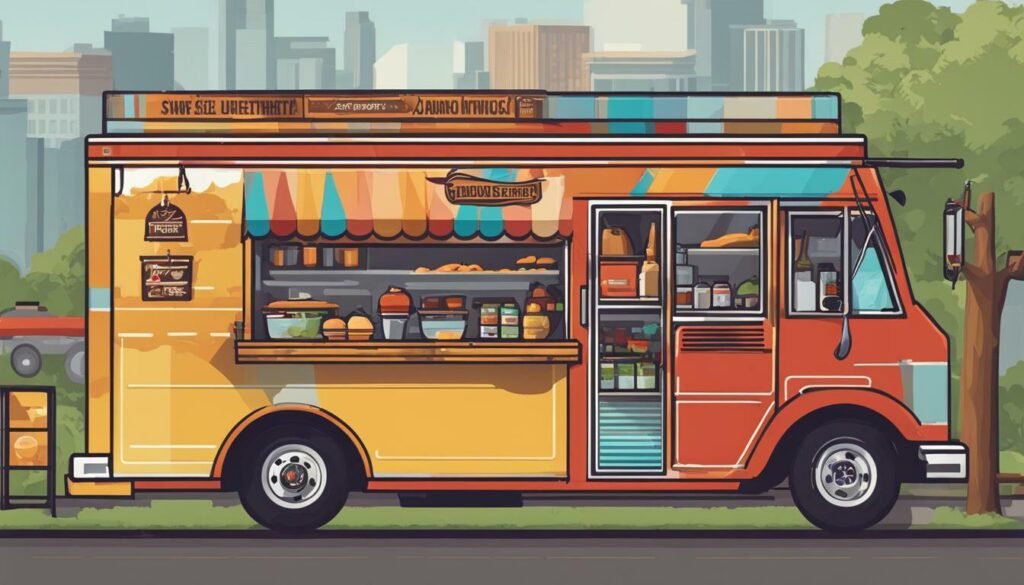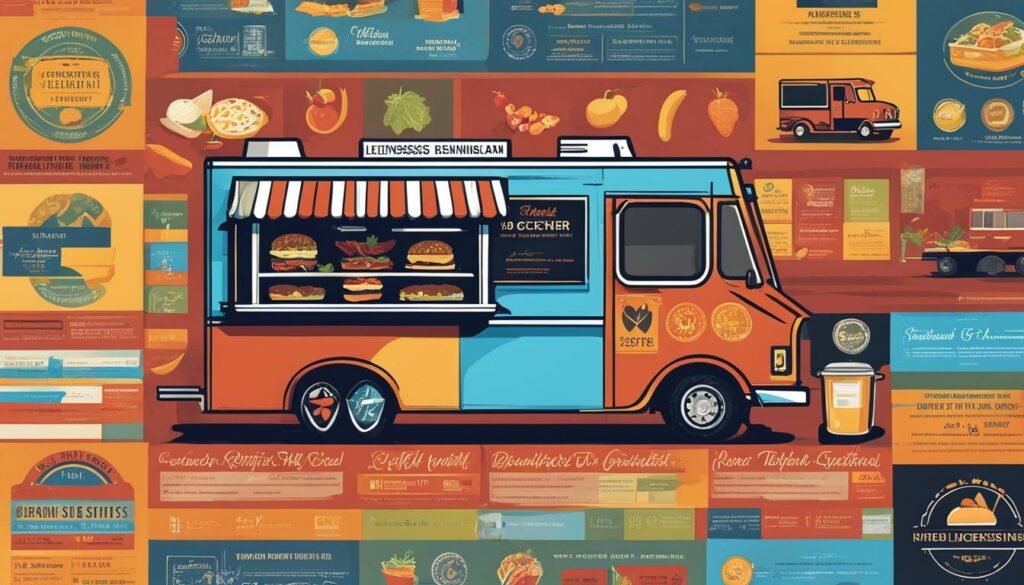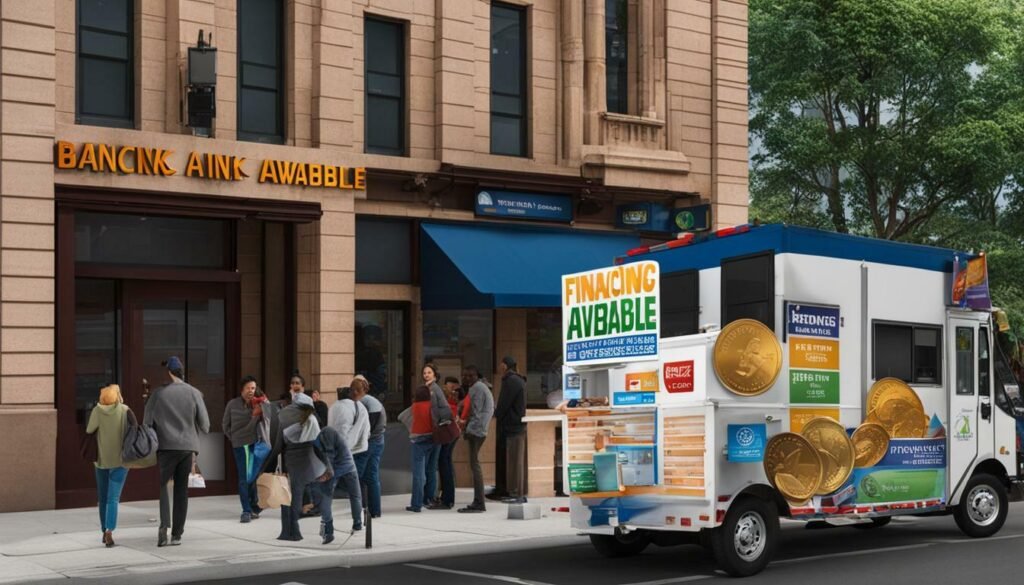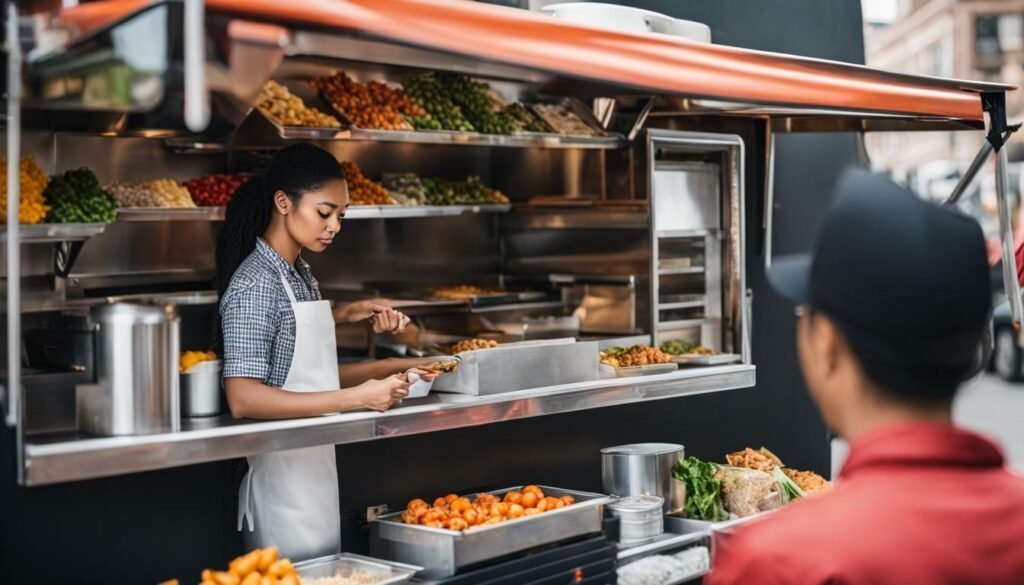Are you looking for unique and profitable food truck ideas to kickstart your own successful business? In this comprehensive guide, I will provide you with everything you need to know to launch a thriving food truck venture. From choosing the right truck to calculating start-up costs, identifying your target customers, and creating a standout brand, this guide covers it all.
- Starting a food truck business requires careful planning and consideration.
- Decide whether to buy a new or used truck, with a used truck being a more cost-effective option for beginners.
- Renting a truck is also a possibility, but it may limit expansion opportunities.
- Consider the various costs involved, such as permits, licensing, insurance, equipment, and supplies.
- Create a well-defined business plan to identify your target customers and analyze profitability.
Table of Contents
ToggleChoosing the Right Truck: New, Used, or Rental
When it comes to starting a food truck business, choosing the right truck is a crucial step. The type of truck you select will have a significant impact on your overall costs, potential for expansion, and success in the long run. As a beginner, it’s important to weigh your options and consider what will be the most cost-effective choice for your specific needs.
If you’re looking to minimize initial expenses, buying a used truck can be a viable option. Used trucks are generally more affordable than brand new ones and can provide a cost-effective solution for beginners. However, it’s essential to thoroughly inspect the vehicle and ensure that it is in good condition, both mechanically and aesthetically.

Renting a truck is another option to consider, especially if you’re unsure about the long-term viability or scalability of your food truck business. Renting allows you to test the waters without committing to a significant financial investment upfront. However, it’s important to note that renting may come with limitations, such as restricted hours of operation or limited customization options.
Table 1: Pros and Cons of Buying and Renting a Food Truck
| Buying a Used Truck | Renting a Truck | |
|---|---|---|
| Pros |
|
|
| Cons |
|
|
Ultimately, the decision to buy a new or used truck versus renting one depends on your budget, long-term goals, and comfort level with the level of investment required. Evaluating the pros and cons of each option will help you make an informed decision that aligns with your business objectives.
Choosing the Right Truck: New, Used, or Rental
Calculating Start-Up Costs and Creating a Business Plan
Before you dive into the world of food trucks, it’s essential to calculate your start-up costs and create a solid business plan. Starting a food truck business requires careful financial planning to ensure that you have enough funds to cover the necessary expenses.
The cost of starting a food truck business can vary depending on several factors. These include state and local requirements, permits and licensing fees, insurance, equipment, ingredients, and supplies. It’s important to research and understand these costs to budget effectively and avoid any surprises along the way.
To help you get started, here is a breakdown of the typical expenses you may encounter:
| Expense | Cost |
|---|---|
| Permits and Licensing | $500 – $5,000+ |
| Insurance | $1,000 – $3,000 per year |
| Equipment | $10,000 – $50,000+ |
| Ingredients and Supplies | $500 – $2,000 per month |
These figures are just estimates and can vary depending on your location, the size of your operation, and the type of food you plan to serve. It’s important to do thorough research and reach out to local food truck owners for more accurate cost estimates.
\
Once you have a clear understanding of your start-up costs, it’s time to create a business plan. A well-defined business plan will serve as a roadmap for your food truck business, helping you identify your target customers, analyze profitability, and secure financing if needed.
\
Your business plan should include:
- An executive summary
- A description of your food truck concept
- Market analysis and target customer demographics
- Marketing and sales strategies
- An overview of your menu and pricing
- Financial projections
- Operational plan
- Business structure and legal considerations
By calculating your start-up costs and creating a comprehensive business plan, you will be better equipped to launch and run a successful food truck business. Remember to continuously monitor and adjust your financial projections as you get more accurate data and insights from operating your food truck.

If you’re looking for affordable and creative food truck ideas, we’ve got you covered with our list of 30 low-cost options. Starting a food truck business doesn’t have to break the bank, and these ideas will help you stand out in the competitive food industry without compromising your budget.
1. Specialty Coffee: Tap into the growing demand for artisanal coffee by offering unique blends, flavored lattes, and specialty brewing methods. A mobile coffee truck can attract coffee enthusiasts on the go, offering them a refreshing pick-me-up wherever they are.
2. Churros: Delight customers with the irresistible taste of freshly made churros. This classic Spanish treat is inexpensive to produce and can be served with various dipping sauces or filled with delicious fillings like dulce de leche or Nutella.
3. Grilled Cheese: Take the humble grilled cheese sandwich to the next level by offering gourmet variations with high-quality cheeses and delicious add-ons like bacon, tomato, and avocado. This comfort food favorite is easy to prepare and appeals to a wide range of customers.
4. Poutine: Bring the flavors of Canada to your food truck with poutine. This indulgent dish features French fries topped with cheese curds and smothered in rich gravy. Add your own unique twist by offering different toppings like bacon, pulled pork, or even lobster.
These are just a few of the low-cost food truck ideas that can help you make a mark in the industry. Remember to conduct market research to identify your target customers and tailor your menu and branding accordingly. With a creative concept, a well-thought-out business plan, and the right execution, your food truck business can thrive while keeping costs under control.
Table: Low-Cost Food Truck Ideas
| Food Truck Idea | Description |
|---|---|
| Specialty Coffee | Offer unique blends, flavored lattes, and specialty brewing methods. |
| Churros | Serve freshly made churros with delicious fillings and dipping sauces. |
| Grilled Cheese | Prepare gourmet grilled cheese sandwiches with high-quality cheeses and tasty add-ons. |
| Poutine | Delight customers with French fries topped with cheese curds and rich gravy, with various topping options. |

With the right combination of creativity, affordability, and market research, you can turn your food truck business into a success without breaking the bank. Consider these low-cost food truck ideas as a starting point and customize them to suit your target audience’s tastes and preferences. Whether it’s specialty coffee, churros, grilled cheese, or poutine, there’s a low-cost food truck idea waiting for you to bring it to life.
Market Research and Identifying Your Target Customers
Market research is a critical step in the success of your food truck business. Let’s dive into why it’s important and how to identify your target customers.
Understanding your target market is key to developing a food truck concept and menu that will resonate with your customers. Conducting thorough market research allows you to gather valuable insights about your potential customers’ preferences, demographics, and buying behaviors. By analyzing this information, you can tailor your offerings to meet their needs and stand out from the competition.
There are several methods you can use to conduct market research for your food truck business. One approach is to conduct surveys or interviews with your target audience to gather direct feedback. This can provide valuable insights into what types of food or cuisine they are interested in, their preferred price range, and their dietary restrictions or preferences.

Another method is to analyze existing data and trends in the food industry. This includes researching popular food truck concepts and menu items in your area, as well as identifying any gaps or opportunities in the market. By staying informed about industry trends and consumer preferences, you can ensure that your food truck offers something unique and relevant.
Once you have gathered and analyzed your market research data, you can start identifying your target customers. This involves creating customer personas or profiles that represent your ideal customers. Consider factors such as age, gender, occupation, lifestyle, and preferences. By understanding your target customers, you can tailor your marketing efforts and menu offerings to appeal to their specific needs and interests.
Remember, market research is an ongoing process. It’s important to regularly gather feedback from your customers and stay updated on industry trends to ensure your food truck business remains relevant and successful. By investing time and effort into market research, you can position your food truck for long-term growth and profitability.
Menu Design and Creating a Standout Brand
Your menu design and branding are crucial elements that make your food truck stand out from the crowd. Let’s explore the key considerations for creating an appealing menu and building a strong brand.
Designing an Appealing Menu
When it comes to menu design, simplicity and clarity are essential. A well-organized and visually appealing menu can attract customers and make ordering a breeze. Here are some tips to consider:
- Use legible fonts and font sizes, ensuring that customers can easily read the menu from a distance.
- Group similar items together and consider categorizing your menu sections to help customers navigate easily.
- Showcase your bestselling items or specialties by using eye-catching design elements, such as borders, icons, or call-out boxes.
- Include high-quality photos of your dishes to entice customers and give them a visual representation of what to expect.
By designing an appealing menu, you can create a memorable dining experience and increase customer satisfaction.
Building a Strong Brand
Branding is more than just a logo. It encompasses your food truck’s personality, values, and overall image. Here are some steps to help you build a strong brand:
- Define your target audience and understand their preferences. Tailor your brand messaging to resonate with their needs and desires.
- Create a visually appealing and memorable logo that reflects your food truck’s identity. Ensure that the logo is versatile enough to be used across different mediums, such as menus, social media, and packaging.
- Consistency is key. Use the same color scheme, fonts, and design elements throughout all your branding materials to create a cohesive and recognizable brand.
- Engage with your customers through social media platforms, such as Facebook, Instagram, and Twitter. Regularly post updates, mouth-watering photos, and interact with your followers to build a loyal customer base.
By focusing on menu design and building a strong brand, you can set your food truck apart from the competition and leave a lasting impression on your customers.

Licenses, Registrations, and Permits
Understanding the licensing and permit requirements for your food truck business is crucial to ensure compliance with local regulations and operate legally. Each city and state may have specific rules and regulations, so it’s essential to research and understand the requirements in your area.
Firstly, you will need to obtain a business license, which permits you to operate a food truck within a specific jurisdiction. This license demonstrates that you meet the necessary health and safety standards and have fulfilled all the legal requirements to operate your business.
In addition to the business license, you will likely need specific permits related to your food operations. These permits may include a food service establishment permit, which typically requires an inspection of your food handling and preparation areas. You may also need a mobile food vendor permit or a commissary agreement, depending on your location.
Another crucial aspect to consider is obtaining the necessary registrations, such as registering your food truck as a vehicle for commercial use. This ensures that your truck meets all the required safety standards and regulations set by the Department of Motor Vehicles.
| License/Permit | Description |
|---|---|
| Business License | Allows you to operate a food truck within a specific jurisdiction |
| Food Service Establishment Permit | Ensures compliance with health and safety standards for food handling and preparation areas |
| Mobile Food Vendor Permit | Specific permit for mobile food vendors, may require additional inspections or qualifications |
| Commissary Agreement | Agreement with a licensed kitchen where you can store, prepare, and clean your food truck |
| Vehicle Registration | Registration of your food truck as a commercial vehicle, meeting safety standards |
It’s important to note that the licensing and permit process may involve paperwork, inspections, and fees. Each jurisdiction has its own requirements, so be sure to check with the local authorities or consult with an attorney who specializes in food truck regulations to ensure you have everything in order.

Finding the right financing options for your food truck business is a vital step towards achieving your entrepreneurial dreams. Starting a food truck business requires capital to cover various expenses such as purchasing or renting a truck, acquiring necessary licenses and permits, buying equipment and supplies, and marketing your business effectively. In this section, we will explore different financing options available to help you secure the funds you need.
The most common financing option for small businesses, including food trucks, is a business loan. Several banks and financial institutions offer loans specifically tailored for entrepreneurs. These loans can provide you with the necessary capital to cover start-up costs and operational expenses. When applying for a business loan, it is essential to have a well-prepared business plan that showcases the potential profitability of your food truck business.
Another option to consider is crowdfunding. Crowdfunding platforms allow you to raise money for your food truck business by reaching out to a large audience and asking for contributions. This method can be particularly effective if you have a unique or creative food truck concept that captures people’s attention and generates interest. Just be sure to offer incentives or rewards to your backers to encourage their support.
If you’re looking for alternative financing options, grants and sponsorships can also be viable choices. Some organizations, both public and private, offer grants specifically for small businesses in the food industry. Research local grants and sponsorship opportunities to see if you qualify for financial assistance. Keep in mind that grants often come with specific requirements and restrictions, so make sure to read and understand the terms before applying.
| Financing Option | Description |
|---|---|
| Business Loan | A loan from a bank or financial institution specifically tailored for entrepreneurs. |
| Crowdfunding | Raising money through online platforms by seeking contributions from a large audience. |
| Grants and Sponsorships | Financial assistance provided by organizations, both public and private, for small businesses in the food industry. |

Key Points:
- Consider taking out a business loan to secure necessary capital for your food truck business.
- Utilize crowdfunding platforms to raise funds by engaging with a broader audience.
- Explore grants and sponsorship opportunities to access additional financing options.
“Finding the right financing options is crucial to turn your food truck dreams into reality. With careful planning and research, you can secure the funding you need to launch and grow your business successfully.” – John Doe, Food Truck Entrepreneur
Finding the Right POS System
A reliable and efficient POS system is essential to streamline your food truck operations. Let’s explore how to find the right POS system for your business.
When choosing a POS system for your food truck, there are several factors to consider. Firstly, you’ll want a system that is mobile-friendly and can handle transactions on the go. Look for a system that works seamlessly on tablets or smartphones, allowing you to take orders and process payments anywhere in your truck.
| Key Features to Consider | Benefits |
|---|---|
| Inventory Management | Track ingredients, supplies, and menu items in real-time, ensuring you never run out of stock. |
| Menu Customization | Easily update and modify your menu items and prices as needed. |
| Integrations | Sync your POS system with other tools such as accounting software or online ordering platforms. |
| Reporting and Analytics | Gain valuable insights into your sales, customer preferences, and overall performance. |
Additionally, look for a POS system that offers inventory management features. This will allow you to track your ingredients, supplies, and menu items in real-time, ensuring you never run out of stock. Menu customization is another important feature, as it enables you to easily update and modify your menu items and prices as needed.
A reliable and efficient POS system is essential to streamline your food truck operations.
Integrations are also worth considering. Look for a POS system that can seamlessly sync with other tools such as accounting software or online ordering platforms. This integration can save you time and effort by automating tasks and reducing manual data entry.
Benefits of a POS System
- Efficiently process transactions and accept various payment methods.
- Track sales and inventory in real-time, optimizing your supply chain and reducing waste.
- Generate detailed reports and analytics to help you make data-driven business decisions.
Lastly, ensure that the POS system you choose provides reliable customer support and regular software updates. This will ensure that your system remains up to date and any issues or glitches are promptly addressed.
By considering these key factors and understanding your specific business needs, you can find the right POS system that will help you streamline your food truck operations and enhance your overall customer experience.

Launching and running a successful food truck business requires careful planning, market research, and a touch of creativity. With the right ideas and strategies, you can create a unique and profitable food truck venture.
When starting a food truck business, the first decision you need to make is whether to buy a new or used truck. For beginners, a used truck can be a more cost-effective option. However, renting a truck is also a possibility, although it may limit expansion opportunities.
Considerable costs are involved in starting a food truck business. These include state and local requirements, permits and licensing fees, insurance, equipment, ingredients, and supplies. Creating a well-defined business plan is crucial as it helps identify costs, target customers, and profitability.
In our comprehensive guide, we provide a list of 30 low-cost food truck ideas to consider. From specialty coffee and churros to grilled cheese and poutine, there are unique suggestions to suit different tastes and preferences.
Market research plays a vital role in understanding your target customers and their preferences. By tailoring your food truck concept and menu to attract the right customers, you can increase your chances of success. Additionally, menu design and branding are key elements in attracting customers and creating a standout brand.
Before launching your food truck business, ensure that you have obtained the necessary licenses, registrations, and permits to operate legally. Understanding the legal requirements in your location is crucial to avoid any unnecessary issues or penalties.
Financing your food truck business can be a challenge, but there are various options available, such as loans, grants, crowdfunding, and partnerships. Exploring these options will help you secure the necessary funds to start or expand your food truck business.
Finally, choosing the right Point of Sale (POS) system is essential for the smooth operation of your food truck. Consider the essential features and functionalities when making your selection to ensure it meets your specific needs.
In conclusion, starting a food truck business can be an exciting and fulfilling venture. By following the complete business guide and implementing the right strategies, you can turn your food truck ideas into a successful and profitable reality. Good luck on your food truck journey!
FAQ
What are the options for buying a truck for a food truck business?
You can choose to buy a new or used truck, or consider renting one.
What are the advantages of buying a used truck?
Buying a used truck is a more cost-effective option, especially for beginners.
Will renting a truck limit expansion opportunities?
Renting a truck may limit expansion opportunities compared to owning one.
What are the costs involved in starting a food truck business?
The costs can vary depending on state and local requirements, permits and licensing, insurance, equipment, ingredients, and supplies.
How important is a food truck business plan?
A food truck business plan is crucial for identifying costs, targeting customers, and assessing profitability.
Can you provide some low-cost food truck ideas?
Yes, we have a list of 30 low-cost food truck ideas, including specialty coffee, churros, grilled cheese, and poutine.
Why is market research important for a food truck business?
Market research helps you understand your target customers and their preferences, allowing you to tailor your concept and menu accordingly.
What role does menu design and branding play in a food truck business?
Menu design and branding are crucial for attracting customers and creating a standout brand that leaves a lasting impression.
What licenses and permits are required for a food truck business?
The necessary licenses, registrations, and permits vary depending on your location. We will guide you through the legal requirements.
What financing options are available for a food truck business?
There are various financing options, such as loans, grants, crowdfunding, and partnerships, to help you secure funds.
How do I find the right POS system for my food truck business?
We will discuss the essential features to consider when selecting a POS system and provide recommendations based on your specific needs.











